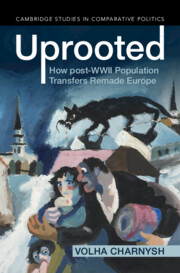Book contents
- Frontmatter
- Contents
- Figures
- Maps
- Tables
- Preface and Acknowledgments
- Abbreviations
- Part I Introduction
- Part II Social Cohesion and Public Goods
- Part III State Building in the Wake of Displacement
- Part IV Long-Run Economic Consequences of Uprooting
- 7 Economic Implications of Diversity in Poland
- 8 Economic Implications of Diversity in West Germany
- 9 Conclusion
- Appendix A Additional Maps, Figures, and Tables
- Appendix B Sources for Archival and Statistical Data
- References
- Index
- Cambridge Studies in Comparative Politics
7 - Economic Implications of Diversity in Poland
from Part IV - Long-Run Economic Consequences of Uprooting
Published online by Cambridge University Press: 07 November 2024
- Frontmatter
- Contents
- Figures
- Maps
- Tables
- Preface and Acknowledgments
- Abbreviations
- Part I Introduction
- Part II Social Cohesion and Public Goods
- Part III State Building in the Wake of Displacement
- Part IV Long-Run Economic Consequences of Uprooting
- 7 Economic Implications of Diversity in Poland
- 8 Economic Implications of Diversity in West Germany
- 9 Conclusion
- Appendix A Additional Maps, Figures, and Tables
- Appendix B Sources for Archival and Statistical Data
- References
- Index
- Cambridge Studies in Comparative Politics
Summary
The chapter examines how the size and diversity of the migrant population shaped economic outcomes in western Poland using statistical analysis. It shows that when state institutions were extractive, the composition of the migrant population played no role in shaping economic performance. Once institutions became more inclusive, however, municipalities settled by more regionally diverse populations registered higher incomes and entrepreneurship rates. The chapter then rules out a series of alternative explanations for these findings.
Keywords
- Type
- Chapter
- Information
- UprootedHow post-WWII Population Transfers Remade Europe, pp. 173 - 199Publisher: Cambridge University PressPrint publication year: 2024

